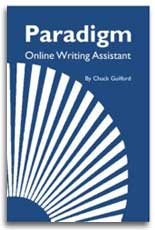Expletives and Passive Constructions
These constructions can drain your style of vigor and confuse meaning.
These common sentence patterns are undeniably useful, but overused by beginners who don't see that these constructions can drain their style of vigor and confuse meaning.
Expletives, as the term is used here, are words used primarily to take up space. They fill a slot in a sentence or round out a rhythm. Their meaning isn't important. They're commonly placed in the subject slot when a writer either doesn't know or doesn't want to name the agent. Notice how "it" and "there" work in the following examples.
With expletive: It has been decided that we will meet next Monday.
Without expletive: We have decided to meet next Monday.
With expletive: There are good job opportunities in computer science.
Without expletive: Computer science offers good job opportunities.
In both cases the second choice is more economical, more direct, and therefore preferable for most situations. Another concern with expletives as subjects is subject-verb agreement. Because "there" is neither singular nor plural, it can't tell you whether you'll need a singular or a plural verb. To learn that, you need to look at the complement.
Not in agreement: There's two good catchers on our team.
In agreement: There are two good catchers on our team.
Rewrite the sentence above without an expletive. Is it weaker or stronger?
In passive constructions the subject is the receiver of the action rather than the agent. Like constructions that open with expletives, passives can be useful when you wish to emphasize the results of an action or when you don't want to draw attention to the doer of the action.
Passive: Most of those mansions were built by wealthy lumber barons.
Active: Wealthy lumber barons built most of those mansions.
Which is stronger? It's hard to say. True, the second sentence is slightly shorter, but the guiding factor here probably would be whether the writer wanted to emphasize the mansions or the lumber barons.
Passive voice most often causes problems when it adds unnecessary words without producing any clear benefits. Find weak passive constructions in the following passage:
I played the fish slowly and carefully, not wanting to take a chance that it might snap the thin tippet at the end of my line. At last it grew tired. When it finally turned over on its side in exhaustion, I eased it into my net. The fly was carefully taken from its mouth, but as I paused for a moment to admire the trout's colors before putting it away in my creel, one last leap was made by it, out of my hands and back into the stream.
Activity
3.9 Read the following sentences to see if any could be improved by using expletives or passive constructions differently. Some may be fine as they stand; if so, make no change. Otherwise, rewrite the sentence to make it stronger.
a. It's supposed to rain again this afternoon.
b. My motorcycle was bought by a dentist. My stereo was bought by a young girl. Everyone bought something.
c. There's several ways of solving the problem.
d. A person can solve the problem in several ways.
e. There are many benefits to come from living in the city.
f. Last night a very funny story about my father was told to me by a total stranger.
g. Whoever was there at the time built a quaint cabin near the marsh.
h. There's a candidate for every office.
i. It's amazing to me that I could have flunked chemistry.
j. There was only one point that was raised by him that I objected to.




